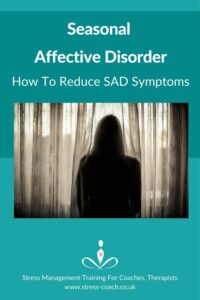6 Ways To Reduce Seasonal Affective Disorder also known as SAD. What is SAD? and why is SAD known as winter depression more common in the UK and other countries far away from the equator.
What is SAD? Seasonal Affective Disorder
SAD Seasonal Affective Disorder is a type of depression that is usually more apparent in the winter. It tends to appear as days get shorter and darker that is why its more common in countries who tend to have less light during the winter time. Although the exact reason for this problem hasn’t been completely identified much research suggests low sunlight impacts the functioning of the hypothalamus. Which is suspected to affect both melatonin and serotonin production as well as the bodies circadian rhythm our body clock.
Lack Of Vitamin D And Seasonal Affective Disorder
We know lack of vitamin D which can be caused by lack of exposure to sunshine is seen in many Season Affective Disorder sufferers. This is one of the reasons SAD lamps, lamps that stimulate sunlight are a common treatment for Seasonal Affective Disorder sufferers.
Common Symptims Of SAD
Symptoms of Seasonal Affective Disorder can include below during the darker, winter months.

Crave carbohydrates, sugary foods and stimulants.
Fatigue, tiredness
Increased sleep
Increased weight gain
Low mood, even depression
Low energy, lack of motivation.
Lack of social interest/withdrawal
Lack of enjoyment in life
6 Ways To Reduce SAD Seasonal Affective Disorder
Healthy Eating– is vital when we are suffering from any type of depression. We may not feel like eating or want to overeat on comfort food when we are feeling low. But eating food with low nutritional content can seriously increase depression. Healthy juices and smoothies are great options, especially those that are rich in vitamin B’s, as low vitamin levels can increase anxiety, depression and stress. Vitamin D -According to medical research “Seasonal Affective Disorder (SAD) is prevalent when vitamin D stores are typically low” and according to University Health News “Vitamin D deficiency symptoms have been linked to numerous health problems, including heart disease, depression, and even cancer.[1] Here are 10 signs you’re not getting enough vitamin D:” There are two types of Vitamin D, D2 and D3 we know D3 obtained through sunlight is the main culprit in SAD but you can get D3 in certain foods and vitamin d3 supplements. We know Salmon, Mackerel and Cod Liver Oil are great sources of Vitamin D
Day Light – obviously getting outdoors and getting adequate sunlight is one of the best ways to get more Vitamin D3. But this can depend on your lifestyle, where you live and your typical working hours if you work inside. Light Therapy such as SAD Boxes or Dawn-simulating alarm clocks can be helpful for those who spend most time indoors. I am largely housebound I have a lightbox and have just invested in a Lumie Body Clock. It recreates sunset and sunrise to help you drift off naturally and wake up gently. This medical device has two aromatherapy chambers, alarm clock, reading and nightlight options.
Daily Exercise – exercise is a great way not just to keep healthier but to boost those happy hormones, decrease sluggishness and motivation. Even a brisk walk at lunchtime or tea break at work can help you feel better especially if you can get some sunlight too.
Reduce Stimulants– we may crave stimulants such as sugar or caffeine but although you may get an initial kick just like any stimulant, your mood will crash a lot lower. That is why alcohol and nicotine can increase anxiety, depression and stress
Cognitive Behaviour Therapy (CBT) – can assist those with more extreme depression and unhealthy thinking patterns during the winter months. Often when someone is depressed they will withdraw from everyday life, social activities and exercise because of lack of motivations which can lead to further depression. CBT supports a healthier mindset and healthier patterns of behaviour.
Holistic Remedies; there are a variety of holistic and herbal remedies available that can support someone suffering from low mood and depression. Flower Essences are something I used regularly with clients with depression there is a wide range of flower remedies that can support different types of depression and emotional anguish. Here in the UK Bach Flower Essences are extremely popular, if in doubt what flower essence to use the combination Bach Rescue Remedy can be used for almost any emotional or mental challenge. It is well-know as an aid for anxiety, worry, stress and trauma. Essential oils are also extremely useful to help improve mood and reduce winter depression for example Orange Oil is a wonderful essential oil that helps boosts ones’ mood, Lemon Oil can also help lift ones mood and can help increase motivation and concentration. You can learn about a variety of essential oils that can help improve mood, reduce anxiety and stress and support your health in my Essential Oils For Home Use Guide.
Like any treatment plan it is important you approach not just the symptoms of your seasonal depression but any underlying challenges that may increase the risk of suffering from SAD. If you suffer from anxiety, stress or depression it is inprortant to get the help and support you deserve.








Thank you for reminding me of how useful Dr Bach’s remedies, even though I have all of them I rarely use them, which is ridiculous when I know how powerful they can be! I now live in a place where sunshine is abundant which I am so grateful for, particularly as my mood changes so rapidly on the occasional grey day. I really didn’t realise that I was affected as much as I am by light. Today I was talking to someone whose wife has been advised not only to sit in the sun for 30 minutes as well take vitamin D for osteoporosis, as you mention this vitamin is super-important. So much useful information in this blog. Thank you
Thank you, Rebecca. I couldn’t agree more about Bach Flower Essences have the full kit too and forget to use them. Although my sister is away with the kit at the moment to help her children deal with a stressful move.
Thanks for the tips, the long dark days of winter definitely affect my mood!
Thank you Karen, definitely a summer person myself
Lots of interesting and useful information here! My favourite ‘therapy’ for low mood is going out for a brisk walk! But lots of other things to try now too!
Thanks Anna, I miss being unable to go for a brisk walk I walked everywhere when I was you younger. It is definitely therapeutic 🙂